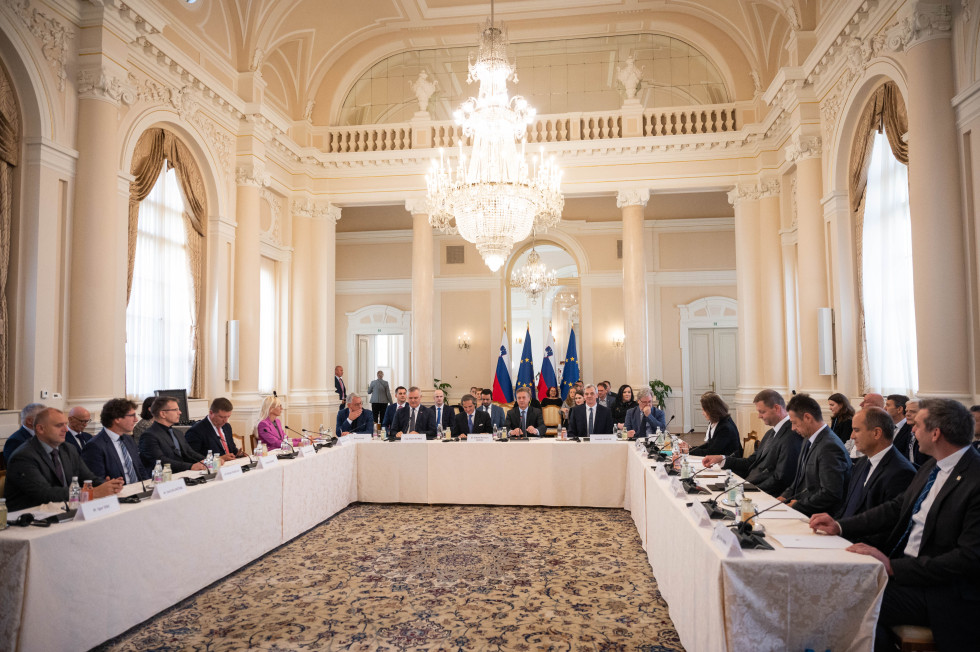Prime Minister Golob: "Nuclear energy is part of the solution to the climate crisis, not part of the problem"

At the invitation of Prime Minister Robert Golob, the Director General of the International Atomic Energy Agency (IAEA), Dr Rafael Mariano Grossi, is visiting Slovenia today | Author Boštjan Podlogar/STA
His visit began with a meeting with the Prime Minister, followed by participation in a panel discussion on the importance of nuclear energy, chaired by the Prime Minister. The discussion focused on the peaceful use of nuclear energy, energy security, and the role of nuclear-weapon states in combating climate change. The event also provided an opportunity for expert dialogue on the significance of nuclear energy and for strengthening cooperation between Slovenia and the IAEA with respect to nuclear new builds and research.
In his opening address, the Prime Minister raised the question of whether we are truly witnessing a nuclear renaissance and what this means for the future of energy. "I want the debate to be as objective and unemotional as possible," he stated, noting that the referendum campaign begins in two weeks. "Today, I hope to shed light on all aspects: what the decision would mean for Slovenia, the unresolved issues we still need to address, and most importantly, the opportunities this presents," added Prime Minister Golob.
He emphasised that the climate crisis is no longer something anyone can deny. Slovenia has been particularly affected by the climate crisis over the past two years, and we can no longer turn a blind eye to it. We must also leverage technology and harness its potential.
"Nuclear energy is part of the solution to the climate crisis, not part of the problem. It is therefore essential that we have clear positions and approach this technology with full responsibility," said the Prime Minister. "Slovenia is already a nuclear state, one of 33 in the world, and that makes our responsibility to not only to our people but to the entire global community all the greater. Ultimately, our decisions will significantly impact the wider region," the Prime Minister added.
Furthermore, our nuclear power plant has been rated as one of the safest. "The level of safety at our nuclear power plant is something we can be justifiably proud of. Slovenia also possesses extensive experience in working with various resources within the energy sector, rather than relying on just one," the Prime Minister stated. He emphasised the need to build on the energy mix. "Any project, especially one of this magnitude that will have broader implications beyond Slovenia's borders, must be approached comprehensively. It should be grounded in facts and developed in partnership with relevant institutions," he said.
In his opening address, IAEA Director General Dr Rafael Mariano Grossi stressed how important nuclear energy is in the current global context. "Climate change and related issues are of paramount importance for our economies. Additionally, the security situation has necessitated a series of decisions to ensure sustainable growth," the Director General stated.
The IAEA Director General presented new trends in nuclear energy and discussed the IAEA's efforts to promote nuclear power as one of the green sources of energy. Dr Grossi also expressed support for the idea of constructing a second unit at the Krško Nuclear Power Plant.
At the end of the panel discussion, which brought together various perspectives on nuclear energy, Prime Minister Golob stated: "The discussion has clearly highlighted, on one hand, the opportunities that nuclear energy can offer for decarbonising our planet, and on the other hand, the concerns, fears, and challenges we must address in implementing nuclear projects effectively anywhere in the world, including Slovenia. We have a lot of work ahead of us to achieve this, and we are not there yet."
The Prime Minister emphasised two key points for Slovenia's future, starting with the decarbonisation targets: "How will nuclear energy contribute to decarbonisation? This is not a short-term solution; we must and will meet our 2030 targets without relying on nuclear energy. However, nuclear energy is essential for Slovenia to fully decarbonise its energy sector by 2040. This is the goal that nuclear energy must help us achieve within the energy mix."
The Prime Minister Golob also spoke about the upcoming referendum: "The referendum is not intended to provide a definitive decision on the nuclear power plant; that is beyond doubt. A final decision can be made in 2027 or possibly 2028, once we have answers to all the challenges raised today, including those from experts who have dedicated their lives to nuclear energy. When these answers are provided – and it will take a couple of years, not just in Slovenia but globally – we will be in a position to make a final decision. If we want to be prepared to move forward in 2027, we need to start investing now. "This referendum is precisely about whether Slovenia is actively preparing by investing in project documentation, research, and human resource development that must occur before a final decision is made. It will also determine if we are willing to invest significant resources, exceeding EUR 100 million. With the upcoming referendum, we aim to gauge whether the population supports this option. The concrete feasibility of the project will be assessed in 2027. What I can announce today is that, in the event of a positive outcome in the referendum, the Freedom Movement party will immediately propose legislation laying the groundwork for the JEK2 project. We will elevate this to the legislative level, as this is the only way to ensure that the project is executed efficiently and that we do not repeat the issues encountered with TEŠ6," concluded the Prime Minister.
As a follow-up to his visit to Slovenia, IAEA Director General Grossi will participate in a roundtable held by the student councils of the Faculties of Civil Engineering, Geodesy, Mechanical Engineering and Electrical Engineering at the University of Ljubljana, in collaboration with the Prime Minister's Office. He will also visit the Krško Nuclear Power Plant.

